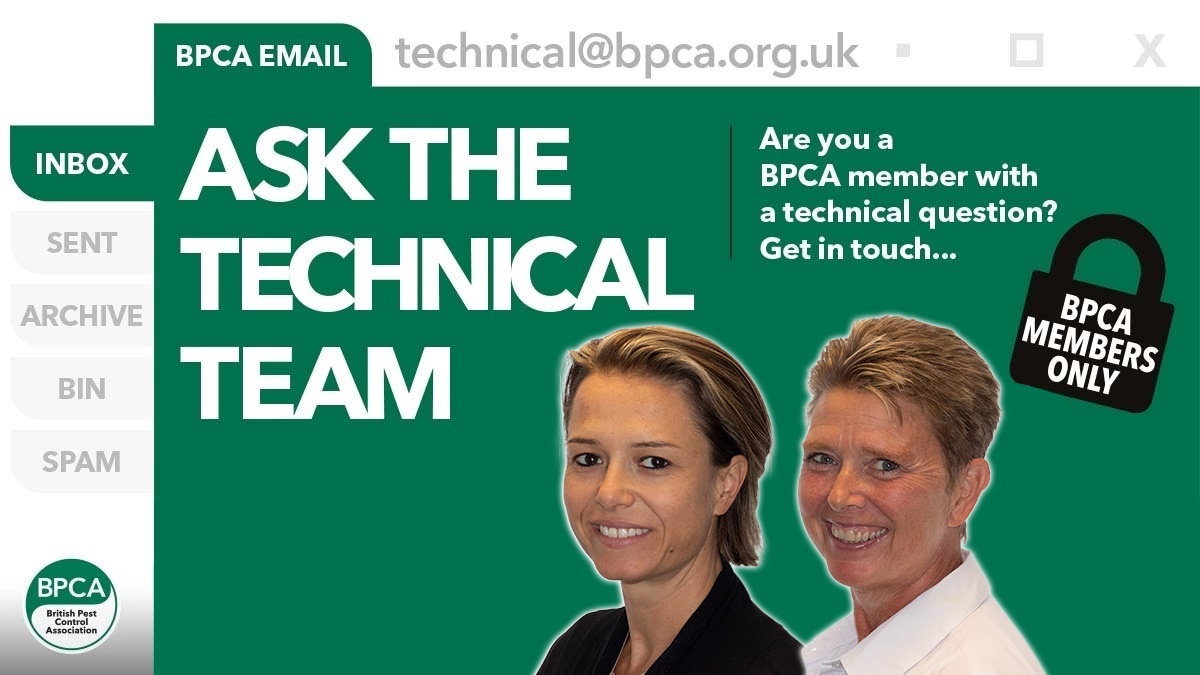PPC116 | Ask the technical team
Pesticides, auditors, assessments and wasp treatment alternatives all feature in this issue of Ask the BPCA technical team.

Should I refrigerate the pesticides in my hot van?
All product labels and safety data sheets will tell you how to store each and every product.
Liquid insecticide labels vary in detail. Some mention avoiding frost, and some refer to maximum temperatures. A few say a maximum of 35°c is best for the environment. In short, excessive heat can cause some pesticides to become less effective.
Pesticides should be stored as stable as possible. On days when you feel your storage may reach excessive temperatures, try to keep it aerated. Some rodenticides, especially those in caulking tubes, can be vulnerable to higher temperatures, so again, keep them stable in whichever way you can.
A fridge may be excessive but you may be tempted to get one just to keep your drinks cold!
Can I force customers to close if they have a bad pest problem?
No. You can advise the customer about what could happen and try to prevent any closures. After all, we are here to provide this service and help protect the business from such possibilities.
If your customer has a food business, then usually an Environmental Health Officer (EHO) would audit the site and potentially close it temporarily to address specific food safety issues, such as the presence of pests.
However, as an adviser to your customer, you may feel that it’d be beneficial for the site to ‘close’ while you focus on a treatment plan, so present this as a discussion rather than an enforceable order.
What should I do if I disagree with an auditor that has given incorrect advice to my client?
As a professional and qualified pest manager, you have a right to ask further questions and ‘appeal’ decisions or reports from an auditor of a specification.
But, it is always best to keep a friendly and positive attitude when asking questions.
Ask them to explain their position a little better so that you can then implement any necessary actions. Give full accounts of your concerns and why you are asking for this extra information. Make the interaction collaborative; after all, everyone is there to improve things!
As a last resort (and if you’re a member), you can ask BPCA to help back you up if your efforts are falling on deaf ears.
As a BPCA member, what are the requirements for BRC audited sites or does the assessment suffice?
In many cases, an auditor will look for membership of an association as part of their compliance checks. But this won’t be their only approach to ensuring you are doing a good job for your customers.
In our opinion, the first step is to ensure you have an excellent site folder (electronic or paper). The more up-to-date and detailed a folder, the better for an auditor! A well-presented and comprehensive ‘folder’ will demonstrate care, attention and professionalism from the start.
We have loads of template documents in the member library, so take a look for inspiration there. And BPCA has created a guidance document on the BRC food safety specification that explains each section of the standard that applies to pest management. If you are a member, login and download it! bpca.org.uk/library
Once I run out of Ficam D, what are the alternatives for controlling wasps?
You should speak to your supplier, so they can go through all of the options available.
We may need to approach wasp treatments a little differently, and even price in the possibility of needing to do follow-ups.
The general advice from BPCA is to treat each wasp nest on a case-by-case basis. If safe to do so, accessing the nest and directly ‘injecting’ a treatment is always going to be the most effective way to control them.
If you have safe and appropriate access to the nest, you may even consider non-chemical methods, such as freeze sprays. Just be safe!
Even if you’ve not run out of a certain product, this is the year to experiment with the treatments you offer to prepare for next summer.
Who you gonna call?
The members of our technical team are happy to come out to visit sites with BPCA members who are struggling with a tough infestation and need hands-on advice. Get in touch!
Are you a BPCA member with a technical question? Get in touch...
technical@bpca.org.uk
01332 294 288
twitter.com/britpestcontrol
Source: